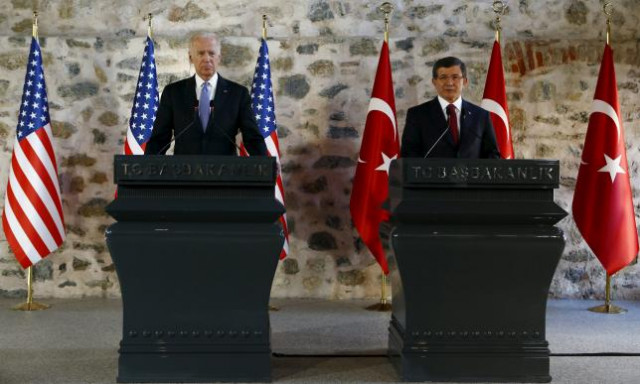US says prepared for military solution against Islamic State in Syria
Biden and Davutoglu discussed how to further support Sunni Arab rebel forces fighting to oust Assad

Turkish Prime Minister Ahmet Davutoglu (R) speaks during a joint news conference with U.S. Vice President Joe Biden in Istanbul, Turkey January 23, 2016. PHOTO: REUTERS
The latest round of Syria peace talks are planned to begin on Monday in Geneva but were at risk of being delayed partly because of a dispute over who will comprise the opposition delegation.
Syria anti-Islamic State documentary maker ‘assassinated’ in Turkey
Syrian armed rebel groups said on Saturday they held the Syrian government and Russia responsible for any failure of peace talks to end the country's civil war, even before negotiations were due to start.
"We do know it would better if we can reach a political solution but we are prepared ..., if that's not possible, to have a military solution to this operation in taking out Daesh," Biden said at a news conference after a meeting with Prime Minister Ahmet Davutoglu. Daesh is the pejorative Arabic acronym for Islamic State insurgents who hold parts of Syria.
A US official later clarified that Biden was talking about a military solution to Islamic State, not Syria as a whole.
The Saudi-backed Syrian opposition ruled out even indirect negotiations unless Damascus took steps including a halt to Russian air strikes.
Biden said he and Davutoglu also discussed how the two NATO allies could further support Sunni Arab rebel forces fighting to oust President Bashar al-Assad.
Istanbul suicide blast kills 10 tourists
The United States has sent dozens of special forces soldiers to help rebels fighting Islamic State in Syria although the troops are not intended for front line combat.
Along with its allies Washington is also conducting air strikes against Islamic State militants who hold large chunks of Syria and Iraq and support opposition fighters battling the group.
US Secretary of State John Kerry said on Saturday he was confident Syria peace talks would proceed, after he held talks with Gulf Cooperation Council (GCC) states in Saudi Arabia.
Kerry also met in Riyadh with Riad Hijab, chair of the Syrian opposition's High Negotiations Committee and other HNC delegates representing the Syrian opposition.
"They discussed the upcoming UN-sponsored negotiations regarding a political transition in Syria and all agreed on the urgent need to end the violence afflicting the Syrian people," US State Department spokesperson John Kirby said.
Kerry also emphasized the importance of maintaining the momentum of the International Syria Support Group, a grouping of big world and regional powers backing peace efforts, Kirby said.
After his GCC talks, Kerry said all in the meeting had agreed that the Support Group should meet again immediately after completion of the first round of the Syria negotiations.
DISAGREEMENT OVER SYRIAN KURDISH GROUP
Saleh Muslim, co-chair of the Kurdish Democratic Union Party (PYD), the main Kurdish political grouping in Syria, said on Friday the Syria peace talks would fail if Syrian Kurds are not represented.
While the United States draws a distinction between PYD, whose fighters it supports, and the outlawed Kurdistan Workers Party (PKK) in Turkey, Davutoglu reiterated the Turkish position that the PYD's military wing is part of and supported by the PKK.
The PYD's military wing, the People's Protection Units (YPG) has seized swathes of Syria from Islamic State with the help of US -led strikes and declared it an autonomous administration, to Ankara's chagrin.
Truck bomb attack by Kurdish militants kills six in southeast Turkey
Davutoglu said on Saturday the YPG had become an increasing threat to Turkey. According to local media, on the way to Turkey from Davos he also told reporters Ankara would strike YPG in northern Syria just like it hits PKK targets in northern Iraq.
Ankara has fought a decades-long insurgency against Kurdish PKK separatists which in July reignited into a violent confrontation with Turkish security forces.
Biden strongly criticized the PKK which is designated a terrorist organization by the United States, the European Union and Turkey.
In his speech following talks, Davutoglu also reiterated Turkey's respect for the territorial unity of Iraq, where it deployed troops despite Baghdad's objections.
Biden went on to meet with President Tayyip Erdogan, but an expected joint statement was not issued. Presidential sources later said Erdogan reemphasized that Turkey's operations in Bashiqa, where the troops were stationed, were for training local forces there.
He called for serious efforts to clear Iraq of terror - starting with Ramadi and followed by Faluja and Mosul.
SLAM OVER FREEDOM OF SPEECH
On the first day of his visit, Biden met members of the ruling AK Party, the secularist opposition CHP and the pro-Kurdish HDP largely to discuss the mainly Kurdish southeast. He criticised the Turkish state for intimidating media, curtailing Internet freedom and accusing academics of treason.
On Saturday, local media reported that on the flight back from Davos Davutoglu told reporters Biden had not spoken with the right people to get a clear picture of what was going on.
Turkey unsettled by 'anti-Islamic' messages in US presidential race: foreign minister
Turkey was cited by Washington as an example for the Middle East of a functioning Islamic democracy in the early years of the AK Party, which Erdogan founded. More recently, reforms have faltered and Erdogan has adopted a more authoritarian style of rule.
Last week, he denounced as "dark, nefarious and brutal" more than 1,000 signatories of a declaration that criticized Turkish military action in the southeast. Security forces briefly detained 27 academics on accusations of terrorist propaganda, while dozens face investigation by their universities.
In an apparent rebuke, Erdogan told Biden on Saturday that he expected sensitivity from Turkey's allies and that they should avoid statements which may equate to support for those trying to hamper Turkish efforts to fight terror, presidential sources said.



















COMMENTS
Comments are moderated and generally will be posted if they are on-topic and not abusive.
For more information, please see our Comments FAQ